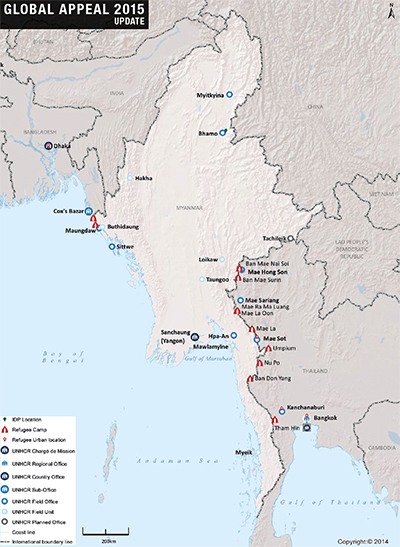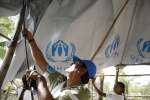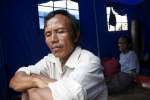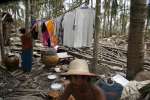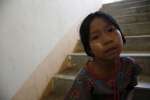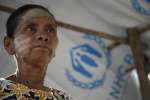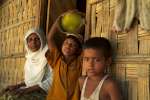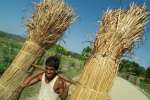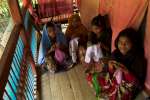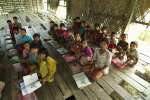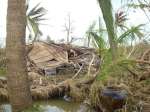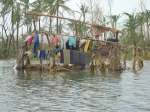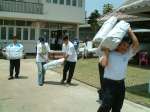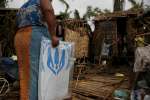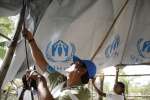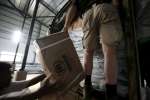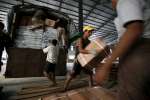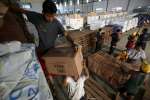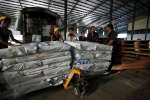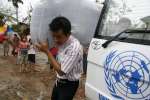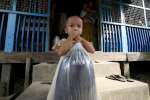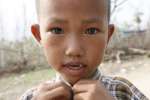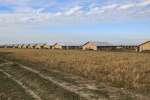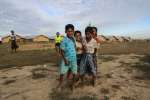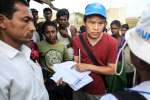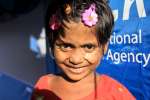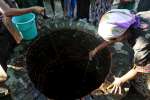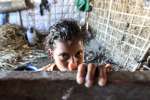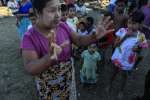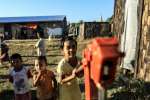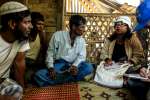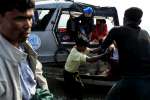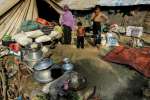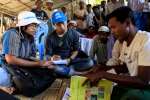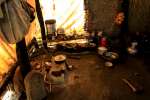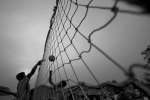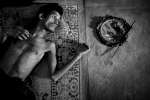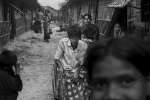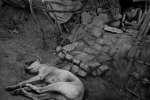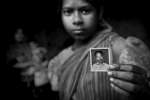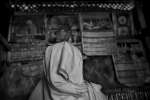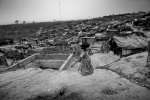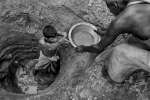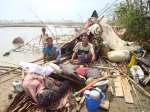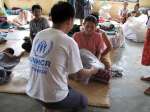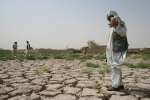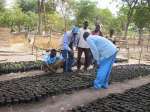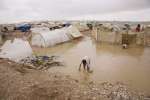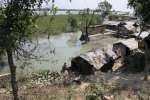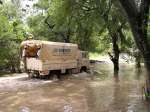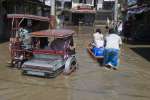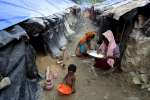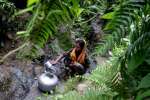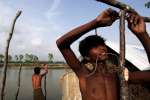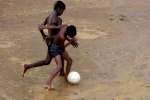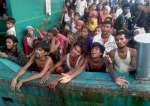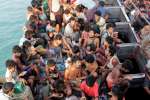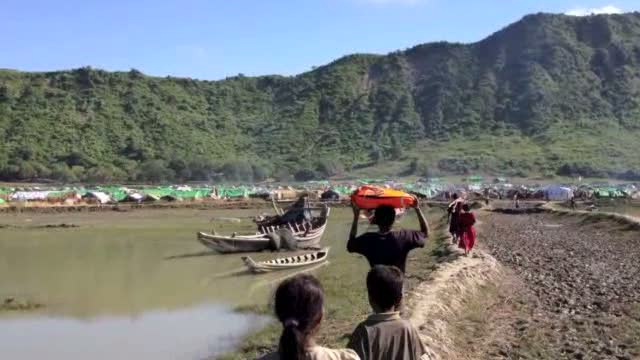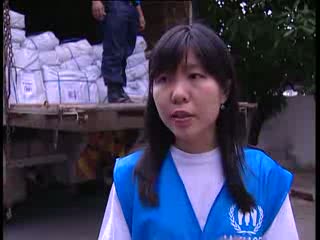Home > Where We Work > Asia and the Pacific > South-East Asia > Myanmar
2015 UNHCR country operations profile - Myanmar
| Overview |
Working environment
-
Fresh displacement was witnessed in 2014 with continued clashes between the Myanmar national army and non-state groups in Kachin and northern Shan States.
-
UNHCR is part of the inter-agency response to internal displacement in Kachin State and northern Shan State, as well as Rakhine State, addressing the needs of more than 240,000 internally displaced people (IDPs).
-
In Kachin State, the Government limits humanitarian agencies' access to IDP sites and aid organizations must seek permission to access areas not under government control.
-
In Rakhine State, the ability of humanitarian agencies to deliver assistance has been severely limited by the political context, while conditions for IDPs deteriorate. More than 800,000 individuals in Rakhine State lack citizenship, in addition to other groups potentially at risk in other parts of Myanmar.
-
UNHCR is assisting 230,000 IDPs living in protracted displacement situations in selected communities in the south-east of Myanmar.
- In the south-east of the country, UNHCR is also monitoring small-scale refugee returns from temporary camps along the Thai border, where some 120,000 refugees from Myanmar are hosted, and is preparing for larger return movements. With ceasefire negotiations underway in 2014, return prospects may increase, though conditions for return remain challenging.
People of concern
The main groups of people of concern to UNHCR in Myanmar in 2015 include people without citizenship, IDPs, refugees, returnees and host communities.
In 2012, violence in Rakhine State forced around 140,000 people to flee their homes.The majority live in government-designated IDP camps near the state capital, Sittwe, and in surrounding townships.
In Kachin State and northern Shan State, more than 100,000 IDPs are displaced and in need of continued humanitarian assistance. They are living in camps in both government-controlled areas, and those under the control of non-state actors.
UNHCR also assists the more than 810,000 people without citizenship in Myanmar.
In south-eastern Myanmar, UNHCR supports communities hosting the estimated 230,000 IDPs living where the organization is operational.
The Office is also preparing for the potential return of some of the 120,000 refugees from Myanmar currently living in temporary camps in Thailand. It is planning support for around 20,000 potential returnees in 2015, although conditions are not yet sufficient to support any organized voluntary return.
| UNHCR 2015 planning figures for Myanmar | |||||
|---|---|---|---|---|---|
| Type of population | Origin | January 2015 | December 2015 | ||
| Total in country | Of whom assisted by UNHCR |
Total in country | Of whom assisted by UNHCR |
||
| Total | 1,497,050 | 442,000 | 1,477,500 | 412,000 | |
| Returnee arrivals during year (ex-refugees) | Myanmar | 10,050 | 5,000 | 40,500 | 20,000 |
| Internally displaced | Myanmar | 587,000 | 312,000 | 514,000 | 264,000 |
| People in IDP-like situations | Myanmar | 35,000 | 35,000 | 35,000 | 35,000 |
| Returnee arrivals during year (ex-IDPs) | Myanmar | 55,000 | 30,000 | 78,000 | 53,000 |
| Stateless | Stateless | 810,000 | 60,000 | 810,000 | 40,000 |
| Response |
Needs and strategies
Significant numbers of IDPs in Kachin and Rakhine States continue to live in camp settings. UNHCR is the sector lead for protection. As part of the inter-agency response, it also leads the shelter, camp coordination and camp management (CCCM), as well as non-food item (NFI) cluster.
In Rakhine State, humanitarian space is severely limited and undertaking basic relief activities has met severe challenges. The situation for most IDPs deteriorated in 2014, particularly health coverage and NFI distributions. The premises and warehouses of the United Nations and most international NGOs were attacked and ransacked in early 2014.
The inter-agency response in Rakhine State has repeatedly emphasized the need for durable solutions for IDPs. At present, there is a continued policy by the Government to physically separate the conflicting communities, which limits reconciliation efforts or space for supporting coexistence.
More than 100,000 IDPs live in Kachin and northern Shan State. Continued clashes between the Myanmar national army and non-state actors in Kachin and northern Shan States in 2014 led to more displacement and a need for an emergency response. The inter-agency response relies on permission from the Myanmar Government to access IDPs in areas under the control of the Kachin Independence Organization (KIO). As a result, only ad hoc missions are undertaken to these areas, limiting the response.
UNHCR will pursue its protection activities and support shelter, CCCM activities, and NFI needs for both Kachin and Rakhine State in 2015. The extent of support offered will rely on developments in the operational areas, particularly levels of access.
In the south-east of Myanmar, UNHCR continues to perform return monitoring to identify the destination of refugees settling back in Myanmar. The aim is to build a profile of areas where interventions can be planned if the scale of returns increases, enabling the Office to respond once spontaneous returns increase. Planning for return is ongoing, including consultations with Myanmar refugees on the Thai border.
| Implementation |
Coordination
While UNHCR's main government partner in Myanmar will continue to be the Ministry of Immigration and Population and the Ministry of Progress of Border Areas and National Races and Development Affairs, UNHCR is also an active member of the Humanitarian Country Team in Myanmar. In Kachin and Rakhine States, UNHCR continues to lead the protection sector and remains the cluster lead agency for shelter, NFI and CCCM. UNHCR also leads the protection sector at national level, which includes UN agencies, international NGOs and several others, including national organizations, and works to raise awareness of protection concerns, enabling an efficient response.
| 2015 UNHCR partners in Myanmar |
|---|
| Implementing partners |
| NGOs: Bridge Asia Japan, Community and Family Services International, Danish Refugee Council, Kachin Baptist Convention, Karuna Myanmar Social Services Bhamo, Karuna Myanmar Social Services - Myitkyina, Lutheran World Federation, Malteser Hilfsdienst Germany, Marie Stopes International, Myanmar Red Cross Society, Shalom (Nyein) Foundation, Première Urgence - Aide Médicale Internationale |
| Operational partners |
| Government agencies: Ministry of Immigration and Population; Ministry for Progress of Border Areas and National Races and Development Affairs; Ministry of Social Welfare, Relief and Resettlement |
| NGOs: Action Against Hunger, International Medical Corps, International Rescue Committee, Médecins Sans Frontières - Netherlands and Switzerland, Metta Development Foundation, Norwegian Refugee Council, Oxfam, Relief International, Solidarités International, Trócaire, World Vision |
| Others: ICRC, International Development Law Organization, IOM, Myanmar Relief Foundation, OCHA, PEACE Law Firm, UNDP, UNFPA, UNICEF, WFP, WHO |
| Financial information |
The budget for UNHCR's operation in Myanmar has been rising since 2012, when a ceasefire between the Myanmar army and the KIO broke down.
Increased interest among refugees in returning to Myanmar requires budget estimates that cover potential activities, should conditions be deemed conducive. Significant financial support may be needed in 2015 to support shelter repair and maintenance in Rakhine and Kachin States. Given the above, the 2015 budget for Myanmar is set at USD 67.8 million.
Source: UNHCR Global Appeal 2015 Update
UNHCR contact information
| The UNHCR Representation in Myanmar | |||||||||||||||
|---|---|---|---|---|---|---|---|---|---|---|---|---|---|---|---|
| Style of Address | The UNHCR Representative in Myanmar | ||||||||||||||
| Street Address | No 287, Pyay Road, Myaynigone, Sanchaung Township, Yangon, Myanmar | ||||||||||||||
| Mailing Address | P.O. Box 1485, Yangon, Myanmar | ||||||||||||||
| Telephone | 95 1 524 022 | ||||||||||||||
| Facsimile | 95 1 524 031 | ||||||||||||||
| myaya@unhcr.org | |||||||||||||||
| Time Zone | GMT + 6.3 | ||||||||||||||
| Working Hours |
|
||||||||||||||
| Public Holidays | 01 January 2015, New Year's day 14 April 2015, Water Festival 15 April 2015, Water Festival 16 April 2015, Water Festival 17 April 2015, Myanmar new year Day 20 July 2015, (Eid al Fitr) 31 July 2015, Full Moon Day of Waso 25 September 2015, eid al adha 28 October 2015, Full moon Day of Thadinkyut 25 December 2015, Christmas Day |
||||||||||||||

